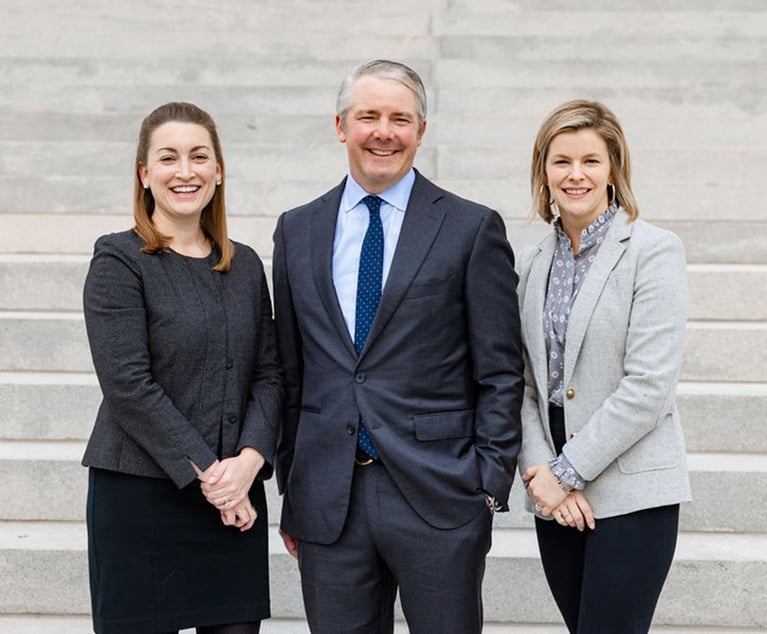US Supreme Court, Rejecting Trump Petition, Lets DACA Program Continue
The Trump administration lost its bid Monday in the U.S. Supreme Court to terminate quickly an immigration program that allows hundreds of thousands of immigrant children, many now adults, to remain in the country lawfully.
February 26, 2018 at 09:53 AM
6 minute read
 A rally at the Supreme Court against the Trump administration's effort to ban immigration from 7 Muslim-majority countries.
A rally at the Supreme Court against the Trump administration's effort to ban immigration from 7 Muslim-majority countries.
Updated at 11:35 a.m.
The Trump administration lost its bid Monday in the U.S. Supreme Court to terminate quickly an immigration program that allows hundreds of thousands of immigrant children, many now adults, to remain in the country lawfully.
The high court refused to act on the government's petition in U.S. Department of Homeland Security v. Regents of the University of California before an appeals court had ruled on the whether the decision to rescind the program was legal.
In denying review of the government's petition “without prejudice,” the justices said, “it is assumed that the Court of Appeals will proceed expeditiously to decide this case.”
U.S. Solicitor General Noel Francisco had asked the high court to review and decide the legality of the Trump administration's Sept. 5 decision to rescind the Deferred Action for Childhood Arrivals, or DACA, program. The request urged the court to act before the U.S. Court of Appeals for the Ninth Circuit ruled on the government's appeal of a trial judge's preliminary injunction.
The Supreme Court rarely agrees to grant review before an appellate court has reached judgment. So-called “certiorari before judgment” is reserved for extraordinary cases; the last time it was granted was nearly 30 years ago.
Justice Department spokesman Devin O'Malley said in a statement Monday: “While we were hopeful for a different outcome, the Supreme Court very rarely grants certiorari before judgment, though in our view it was warranted for the extraordinary injunction requiring the Department of Homeland Security to maintain DACA. We will continue to defend DHS' lawful authority to wind down DACA in an orderly manner.”
After the government announced the program's termination, five related lawsuits challenging the decision were filed in the U.S. District Court for the Northern District of California.
The challengers, led by Covington & Burling's Robert Long and Gibson, Dunn & Crutcher's Theodore Boutrous, include the regents of the University of California, DACA recipients, California and a number of other states and counties, and a labor union. They argued that DACA's rescission violated the Administrative Procedure Act and due process, and denied DACA recipients the equal protection of the laws.
 Theodore J. Boutrous, Jr. Credit: Diego M. Radzinschi/ NLJ
Theodore J. Boutrous, Jr. Credit: Diego M. Radzinschi/ NLJ
“DACA is a lawful and important program that protects young people who came to this country as children and who know this country as their only home. The Dreamers have relied on DACA to make decisions about their education, jobs, and families and to make valuable contributions to society as doctors, lawyers, teachers, and members of the military,” Boutrous said in a statement. “Two federal district courts have now recognized that the Trump administration's abrupt decision to end the program was unlawful. We are confident that the court of appeals will reach the same conclusion and will affirm the district court's injunction that has blocked the rescission from taking effect.”
More than 100 U.S. companies, many in the technology sector, have lined up in support of the DACA program. A Mayer Brown team filed an amicus brief in California federal court. Wilmer Cutler Pickering Hale and Dorr's Seth Waxman signed the brief on behalf of tech clients Airbnb, Square, Twitter and Yelp. In Washington, Microsoft Corp. and Princeton University, represented by Jenner & Block on the joint complaint, sued to keep DACA in place.
U.S. District Judge William Alsup in San Francisco in January issued the first of two temporary nationwide injunctions after finding that the challengers to the government's action were likely to succeed in showing that the decision to rescind the DACA policy was arbitrary and capricious.
On Feb. 13, a second federal judge—Nicholas Garaufis in Brooklyn—issued an order keeping in place the DACA program. Under his order, the DACA program stays in place as it was before the Sept. 5 decision to wind it down. The government does not have to accept new applications and can consider renewals on a case-by-case basis, according to the judge.
That ruling in Vidal v. Nielsen stemmed from lawsuits filed by immigration rights groups and 15 state attorneys general and the District of Columbia.
In U.S. Dept. of Homeland Security v. Regents of the University of California, Francisco asked the justices to decide two questions: whether the decision to rescind the DACA policy is reviewable by courts, and whether the decision is lawful.
➤➤ Also on Monday, the high court granted review in an arbitration case and an age discrimination dispute, both of which will likely be argued next term, beginning in October:
New Prime Inc. v. Oliviera: A broad interpretation of the Federal Arbitration Act that exempts “seamen, railroad employees, or any other class of workers engaged in foreign or interstate commerce” is the issue in this case brought by a Massachusetts trucking company. Gibson, Dunn & Crutcher partner Theodore Boutrous Jr. represents the company.
Mount Lemmon Fire District v. Guido: The court will referee a dispute among circuit courts over the scope of the Age Discrimination in Employment Act. At issue is whether the law covers all state political subdivisions of the states or applies only to those subdivision with more than 20 employees, as is the case with private companies. E. Joshua Rosenkranz of Orrick, Herrington and Sutcliffe represents the Mt. Lemmon, Arizona fire district.
Tony Mauro in Washington contributed to this report. This post was updated with additional comment about the Supreme Court's order.
Read more:
This content has been archived. It is available through our partners, LexisNexis® and Bloomberg Law.
To view this content, please continue to their sites.
Not a Lexis Subscriber?
Subscribe Now
Not a Bloomberg Law Subscriber?
Subscribe Now
NOT FOR REPRINT
© 2025 ALM Global, LLC, All Rights Reserved. Request academic re-use from www.copyright.com. All other uses, submit a request to [email protected]. For more information visit Asset & Logo Licensing.
You Might Like
View All
‘Issue of First Impression’: New York Judge Clears Coinbase Appeal Amid Crypto Regulatory Clash
4 minute read
DC's Birchstone Moore Combines With Chicago-Founded Wealth Planning Firm
3 minute read

Trending Stories
- 1Courts, Lawyers Press On With Business as SoCal Wildfires Rage
- 2Florida, a Political Epicenter, Is the Site of Brownstein Hyatt's 13th Office
- 3Law Firms Close Southern California Offices Amid Devastating Wildfires
- 4Lawsuit alleges racial and gender discrimination led to an Air Force contractor's death at California airfield
- 5Holland & Knight Picks Up 8 Private Wealth Lawyers in Los Angeles
Who Got The Work
Michael G. Bongiorno, Andrew Scott Dulberg and Elizabeth E. Driscoll from Wilmer Cutler Pickering Hale and Dorr have stepped in to represent Symbotic Inc., an A.I.-enabled technology platform that focuses on increasing supply chain efficiency, and other defendants in a pending shareholder derivative lawsuit. The case, filed Oct. 2 in Massachusetts District Court by the Brown Law Firm on behalf of Stephen Austen, accuses certain officers and directors of misleading investors in regard to Symbotic's potential for margin growth by failing to disclose that the company was not equipped to timely deploy its systems or manage expenses through project delays. The case, assigned to U.S. District Judge Nathaniel M. Gorton, is 1:24-cv-12522, Austen v. Cohen et al.
Who Got The Work
Edmund Polubinski and Marie Killmond of Davis Polk & Wardwell have entered appearances for data platform software development company MongoDB and other defendants in a pending shareholder derivative lawsuit. The action, filed Oct. 7 in New York Southern District Court by the Brown Law Firm, accuses the company's directors and/or officers of falsely expressing confidence in the company’s restructuring of its sales incentive plan and downplaying the severity of decreases in its upfront commitments. The case is 1:24-cv-07594, Roy v. Ittycheria et al.
Who Got The Work
Amy O. Bruchs and Kurt F. Ellison of Michael Best & Friedrich have entered appearances for Epic Systems Corp. in a pending employment discrimination lawsuit. The suit was filed Sept. 7 in Wisconsin Western District Court by Levine Eisberner LLC and Siri & Glimstad on behalf of a project manager who claims that he was wrongfully terminated after applying for a religious exemption to the defendant's COVID-19 vaccine mandate. The case, assigned to U.S. Magistrate Judge Anita Marie Boor, is 3:24-cv-00630, Secker, Nathan v. Epic Systems Corporation.
Who Got The Work
David X. Sullivan, Thomas J. Finn and Gregory A. Hall from McCarter & English have entered appearances for Sunrun Installation Services in a pending civil rights lawsuit. The complaint was filed Sept. 4 in Connecticut District Court by attorney Robert M. Berke on behalf of former employee George Edward Steins, who was arrested and charged with employing an unregistered home improvement salesperson. The complaint alleges that had Sunrun informed the Connecticut Department of Consumer Protection that the plaintiff's employment had ended in 2017 and that he no longer held Sunrun's home improvement contractor license, he would not have been hit with charges, which were dismissed in May 2024. The case, assigned to U.S. District Judge Jeffrey A. Meyer, is 3:24-cv-01423, Steins v. Sunrun, Inc. et al.
Who Got The Work
Greenberg Traurig shareholder Joshua L. Raskin has entered an appearance for boohoo.com UK Ltd. in a pending patent infringement lawsuit. The suit, filed Sept. 3 in Texas Eastern District Court by Rozier Hardt McDonough on behalf of Alto Dynamics, asserts five patents related to an online shopping platform. The case, assigned to U.S. District Judge Rodney Gilstrap, is 2:24-cv-00719, Alto Dynamics, LLC v. boohoo.com UK Limited.
Featured Firms
Law Offices of Gary Martin Hays & Associates, P.C.
(470) 294-1674
Law Offices of Mark E. Salomone
(857) 444-6468
Smith & Hassler
(713) 739-1250










